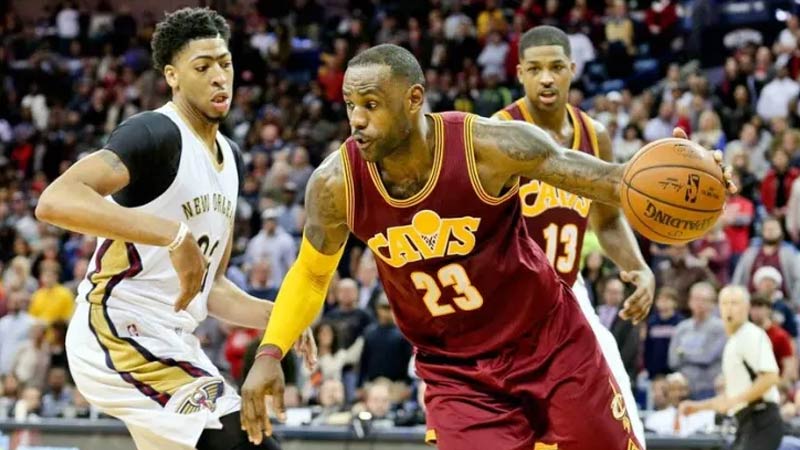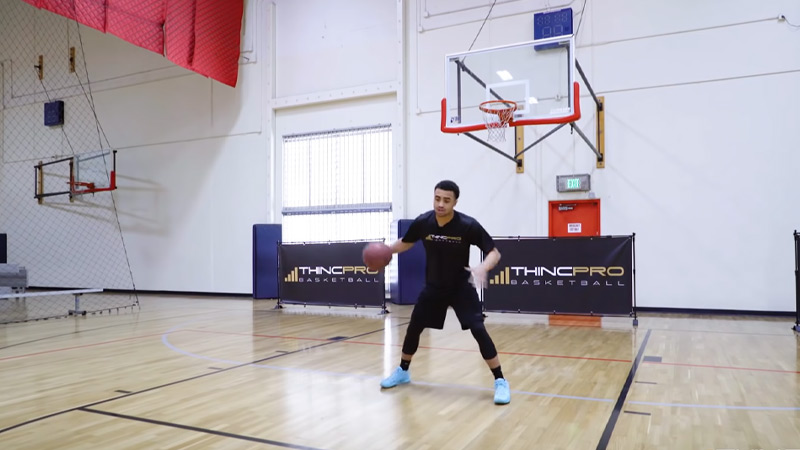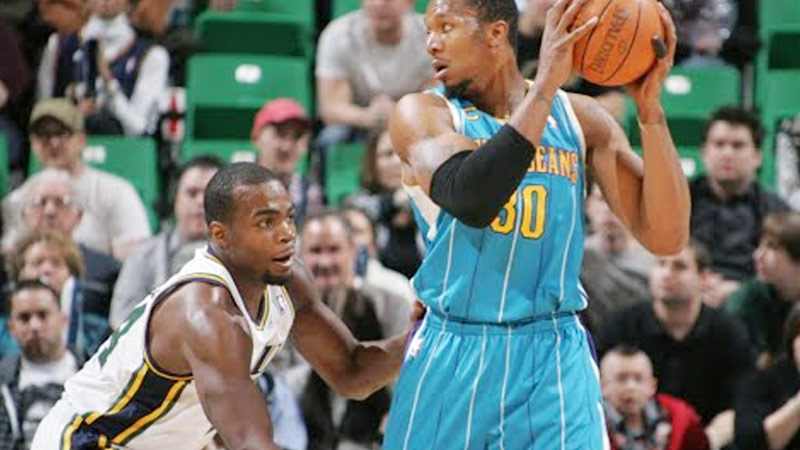Basketball is a game that requires skill, finesse, and strategy. However, there is also a place for physicality and toughness on the court.
Enter the enforcer, a player who is known for their physical presence, intimidation factor, and ability to enforce the team’s will.
In this blog post, we will explore the role of an enforcer in basketball, the qualities required to excel in this role, their duties and responsibilities, and how to practice and improve as an enforcer.
What is an Enforcer in Basketball?
In basketball, an enforcer is a player known for their physicality, toughness, and ability to intimidate opponents.
The enforcer’s role is to provide a strong defensive presence, protect their teammates, and set a physical tone on the court. They excel in rebounding, setting hard screens, and playing aggressive defense.
Throughout the history of the sport, notable enforcers have made their mark, including Bill Laimbeer of the Detroit Pistons, Charles Oakley of the Chicago Bulls and New York Knicks, and Dennis Rodman, who played for the Detroit Pistons, Chicago Bulls, and Los Angeles Lakers.
These enforcers have left a lasting impact on the game through their physicality, defensive prowess, and tenacity.
Who Can Be an Enforcer in Basketball?
The role of an enforcer in basketball is not limited to a specific position on the court. While traditionally associated with bigger and more physical players, such as power forwards or centers, the enforcer role can be filled by players from various positions, including guards, forwards, and centers.
What truly defines an enforcer is not solely their size and strength, but rather their mentality and approach to the game.
Duties and Responsibilities of an Enforcer in Basketball

Source: pelicandebrief.com
The primary duty of an enforcer is to provide physicality and toughness to their team.
They act as a deterrent to opposing players, making them think twice before driving to the basket or challenging their teammates.
Some key responsibilities of an enforcer include:
Physical Defense
An enforcer is tasked with playing tough and physical defense, making it difficult for opponents to score. They use their size, strength, and aggressiveness to disrupt opposing players and provide a physical presence on the court.
Rebounding and Boxing Out
Enforcers excel at grabbing rebounds and boxing out opponents to create space for their teammates. They are relentless in their pursuit of the ball and often initiate contact to establish dominance in the paint.
Setting Screens
Enforcers are adept at setting hard screens to create opportunities for their teammates. They use their strength and positioning to impede defenders, opening up scoring chances for their team.
Protecting Teammates
One of the crucial roles of an enforcer is to protect their teammates. They are quick to intervene when an opponent attempts to intimidate or harm their fellow players.
This role requires mental toughness, composure, and a willingness to stand up for the team.
How to Practice to Improve the Skill of an Enforcer

Becoming an effective enforcer in basketball requires a combination of physicality, skill, and mental preparation. Here are some practice tips to improve as an enforcer:
Strength and Conditioning
Focus on building strength, power, and endurance through weight training, conditioning drills, and functional exercises.
This will enhance your physical presence on the court and allow you to withstand the demands of playing a physical style of basketball.
Incorporate exercises like squats, deadlifts, lunges, and plyometric drills to improve explosiveness and overall athleticism.
Defensive Techniques
Work on defensive drills that emphasize positioning, footwork, and body control.
Practice techniques such as sliding laterally, staying low in a defensive stance, and using your hands effectively to contest shots and disrupt passing lanes.
Develop the ability to anticipate offensive moves and react quickly to make defensive plays.
Boxing Out and Rebounding
Develop your rebounding skills by practicing boxing out drills and working on your timing and positioning.
Understand the importance of gaining inside position, using your body to create space, and aggressively pursuing the ball.
Focus on reading the trajectory of the shot and positioning yourself accordingly to secure rebounds.
Screen Setting
Hone your screen-setting abilities by practicing different types of screens, including ball screens, off-ball screens, and pin-down screens.
Focus on timing, communication with your teammates, and establishing a solid base to maximize the effectiveness of your screens.
Screen with purpose, creating separation for your teammates and creating scoring opportunities.
Mental Toughness
Mental preparation is vital for an enforcer. Work on developing a competitive mindset, staying focused during high-pressure situations, and embracing physical challenges.
Build resilience and maintain composure in the face of adversity. Visualize successful defensive plays, anticipate opponents’ moves, and cultivate a strong self-belief that you can dominate defensively.
Game Situational Drills
Incorporate game-like scenarios into your practice sessions to simulate real-game situations. Work on defending against different offensive strategies, such as pick-and-rolls, isolation plays, and off-ball movement.
This will help you adapt your defensive skills to different situations and opponents.
Film Study
Watch game footage of elite enforcers and study their defensive techniques, positioning, and decision-making.
Analyze their strategies, how they communicate with teammates, and their overall impact on the game. Identify areas where you can improve and implement those lessons into your own game.
Practice with Intensity
In every practice session, bring a high level of intensity and effort. Treat each drill as if it were a game situation, giving your best on every play.
By practicing with intensity, you will develop the habits and instincts necessary to be an impactful enforcer.
Top 10 Best Enforcers of All Time: At a Glance
| Rank | Player | Team(s) | Years Active |
|---|---|---|---|
| 1 | Bill Laimbeer | Detroit Pistons | 1980-1994 |
| 2 | Charles Oakley | Chicago Bulls, New York Knicks, Toronto Raptors, Washington Wizards, Houston Rockets | 1985-2004 |
| 3 | Dennis Rodman | Detroit Pistons, Chicago Bulls, Los Angeles Lakers, Dallas Mavericks | 1986-2000 |
| 4 | Maurice Lucas | Portland Trail Blazers, New Jersey Nets, New York Knicks, Phoenix Suns, Los Angeles Lakers | 1976-1988 |
| 5 | Kevin McHale | Boston Celtics | 1980-1993 |
| 6 | Ben Wallace | Washington Bullets/Wizards, Orlando Magic, Detroit Pistons, Chicago Bulls | 1996-2012 |
| 7 | Rick Mahorn | Washington Bullets/Wizards, Detroit Pistons, Philadelphia 76ers | 1980-1999 |
| 8 | Metta World Peace (formerly Ron Artest) | Chicago Bulls, Indiana Pacers, Sacramento Kings, Houston Rockets, Los Angeles Lakers, New York Knicks | 1999-2017 |
| 9 | Anthony Mason | New Jersey Nets, Denver Nuggets, New York Knicks, Charlotte Hornets, Miami Heat, Milwaukee Bucks | 1988-2003 |
| 10 | Bruce Bowen | Miami Heat, Boston Celtics, Philadelphia 76ers, San Antonio Spurs | 1997-2009 |
FAQs
Can an enforcer be a skilled offensive player as well?
Yes, some enforcers possess offensive skills, but their primary role is to provide physicality and toughness on the court.
While their offensive contributions may not be their main focus, some enforcers have developed respectable offensive games. They may have the ability to score inside the paint, set effective screens, or make timely passes to their teammates.
However, it’s important to note that their offensive skills are often secondary to their primary role of enforcing a physical presence.
Are enforcers prone to fouling?
Enforcers often walk a fine line between physical play and committing fouls. Given their aggressive style of play, enforcers are more prone to drawing fouls or being called for fouls themselves.
It requires discipline and control to maintain their physicality without crossing the line and committing excessive or unnecessary fouls.
Experienced enforcers understand the importance of staying on the court and making impactful contributions while avoiding foul trouble.
Is the enforcer role becoming less significant in modern basketball?
The enforcer role has evolved in modern basketball, with the game placing a greater emphasis on skill, pace, and finesse. However, physicality and toughness still hold value in certain aspects of the game.
While the traditional enforcer role may not be as prominent, players who bring a strong defensive presence, rebounding ability, and an intensity that sets the tone for their team are still highly valued.
The enforcer’s role may have adapted to fit the modern style of play, but their impact on the court remains significant in terms of defense, rebounding, and providing a sense of intimidation.
Can smaller players be effective enforcers?
While size can provide advantages in terms of physicality, enforcers can come in all shapes and sizes. The enforcer’s role is not solely defined by physical attributes but also by the player’s mentality, approach, and willingness to do the dirty work.
Smaller players who possess tenacity, defensive prowess, and a relentless attitude can effectively enforce their presence on the court. Their ability to disrupt opponents, draw charges, and dive for loose balls can make them formidable enforcers despite their smaller stature.
Are there any current NBA players known for their enforcer-like qualities?
One current NBA player who is often regarded as a modern-day enforcer is Draymond Green of the Golden State Warriors. Green’s defensive intensity, versatility, and willingness to do whatever it takes to help his team succeed have earned him a reputation as a tenacious enforcer.
His ability to guard multiple positions, contest shots, and provide a physical presence in the paint makes him an invaluable asset to the Warriors’ defensive schemes. Green’s vocal leadership and willingness to do the dirty work epitomize the enforcer role in the modern NBA.
Bottom Line
In basketball, an enforcer is a player who brings physicality, toughness, and intimidation to the game. They excel in defensive prowess, rebounding, setting screens, and protecting their teammates.
Becoming an enforcer requires a combination of physical attributes, skill development, and a strong mindset. By practicing specific drills, working on strength and conditioning, and honing defensive techniques, aspiring enforcers can elevate their game.
While the role of an enforcer may have evolved, their impact on the court remains crucial for setting the tone and establishing a competitive edge for their team.







